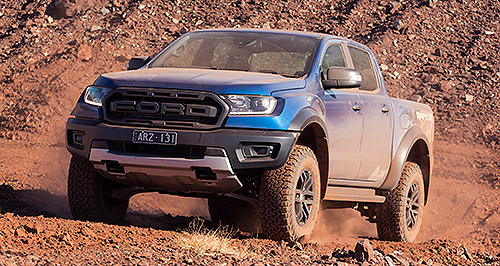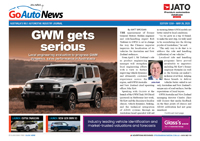News - FordDetroit show: Ford, Volkswagen confirm LCV allianceFamily ties: The Ford Ranger (below) currently shares its underpinnings with the Mazda BT-50, but its next-generation model will instead be aligned with the Volkswagen Amarok (left). Next-generation Ranger, Amarok to be co-developed under Ford, Volkswagen deal16 Jan 2019 FORD Motor Company and Volkswagen Group have confirmed that their next-generation light-commercial vehicles (LCVs), including the Ranger and Amarok mid-size utes due as early as 2022, will be co-developed as part of an alliance officially announced overnight at the Detroit motor show.
With Ford Motor Company tapped to engineer and manufacture the alliance’s mid-size ute, the Ford Asia Pacific product development centre in Broadmeadows, Victoria, could be charged with the responsibility of developing the Ranger again and, as a result, the Amarok for the first time.
Furthermore, Ford Thailand Manufacturing in Rayong, Thailand, may continue to build the Australian-market Ranger while also handling additional volume from the Amarok, which is currently sourced locally from Argentina and Germany, depending on the variant.
Such a move would likely allow Volkswagen Group Australia (VGA) to reduce the Amarok’s premium pricing, which presently faces a five per cent import duty when all of its rivals – including the Ranger – are subject to free-trade agreements that eliminate the tax.
Critically, the fourth-generation Ranger could gain access to the Amarok’s 3.0-litre turbo-diesel V6 engine, which produces 200kW and 580Nm in its most potent guise and would be a significant upgrade over its Raptor flagship’s 157kW/500Nm 2.0 litre four-cylinder unit.
In second-generation form, the Amarok may also benefit from the addition of rear curtain airbags and advanced driver-assist systems, such as autonomous emergency braking and lane-keep assist, all of which are currently available in the Ranger and have been requested by VGA management.
Meanwhile, vans will be the other key pillar of the alliance, with Ford to engineer and manufacture larger models for Europe, while Volkswagen will handle a small-size vehicle.
The large vans that might converge include Ford Motor Company’s Transit Custom and Transit and Volkswagen Group’s Transporter, while the small model could see the former’s Transit Connect and Transit Courier link up with the latter’s Caddy.
“The alliance will enable the companies to share development costs, leverage their respective manufacturing capacity, boost the capability and competitiveness of their vehicles, and deliver cost efficiencies while maintaining distinct brand characteristics,” Ford Motor Company and Volkswagen Group said in a joint press release.
In order to remain the distinct, the co-developed and co-built models will likely feature unique exteriors and interiors, as seen on the third-generation Ranger that came as the result of a similar deal with Mazda and its BT-50, which has since ended.
Combined, Ford Motor Company and Volkswagen Group sold about 1.2 million LCVs globally in 2018, and with the pair expecting demand for mid-size utes and vans to grow in the next five years, this could become the industry’s highest-volume LCV collaboration.
As a result, the alliance estimates its members will achieve improved annual pre-tax operating results from 2023, which could be further boosted if passenger car and SUV development programs become a part of their deal.
While the alliance does not involve cross ownership between the two global car-makers, it could soon expand to include autonomous and electric vehicles, as well as mobility services, with discussions on a broader partnership to continue over the coming months.
The alliance will be governed by a joint committee led by Ford Motor Company president and chief executive officer Jim Hackett and Volkswagen Group chairman of the board of management and chief executive officer Herbert Diess, and featuring senior executives.
According to Mr Hackett, the alliance provides opportunity for its members to prepare more efficiently for the future of rapidly developing automotive industry.
“Over time, this alliance will help both companies create value and meet the needs of our customers and society,” he said.
“It will not only drive significant efficiencies and help both companies improve their fitness, but also gives us the opportunity to collaborate on shaping the next era of mobility.”
Mr Diess echoed this sentiment, adding that alliance members will become more competitive through their collaboration.
“Volkswagen and Ford will harness our collective resources, innovation capabilities and complementary market positions to even better serve millions of customers around the world,” he said.
“At the same time, the alliance will be a cornerstone for our drive to improve competitiveness.”
This is not the first time Ford Motor Company and Volkswagen Group have collaborated, with previous projects including the late-1980s AutoLatina joint-venture in Brazil and Argentina, which involved model rebadging.  Read more6th of November 2018  VW Amarok, Ford Ranger could share platform: report‘If the Ford relationship works out well, we would have an Amarok successor’: Diess27th of September 2018  Australia to influence next-gen Volkswagen AmarokSecond-generation Volkswagen Amarok to benefit from Australian input due to sales |
Click to shareFord articlesResearch Ford Motor industry news |
















Facebook Twitter Instagram